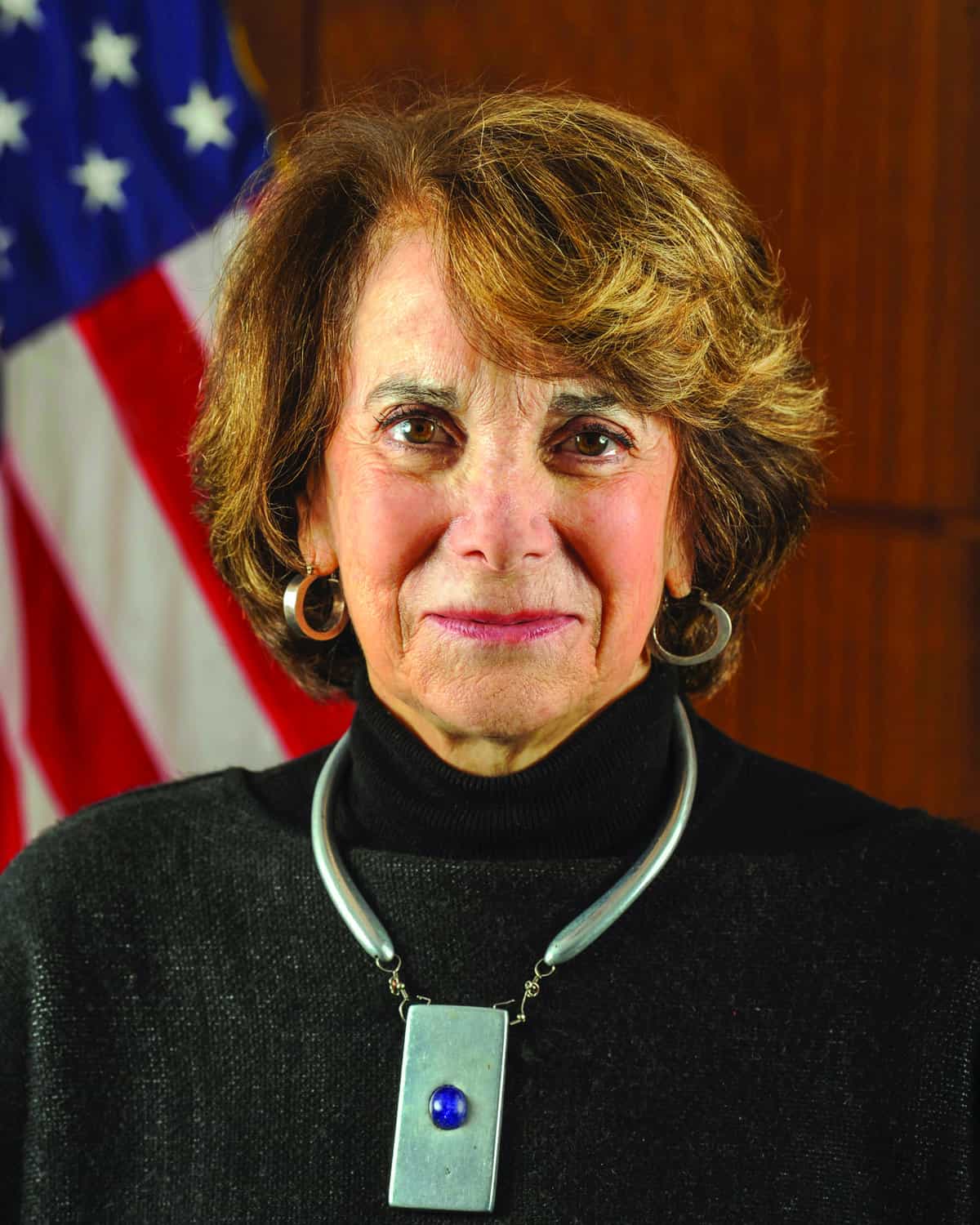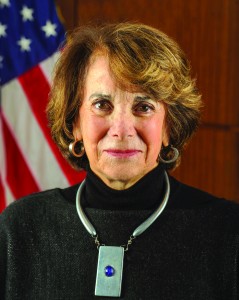Wednesday, December 14, 12 pm, Sandler Family Campus
And How Are the Children?
Timeless Lessons from the Frontlines of Motherhood After Raising a Family of Adopted, Homegrown, Step, and Sponsored Kids
Marjorie Margolies
Wyatt-MacKenzie Publishing
260 pages, 2022
The 2022–23 Lee & Bernard Jaffe Family Jewish Book Festival continues with author Marjorie Margolies who will discuss her book And How are the Children? Timeless Lessons from the Front Lines of Motherhood.
Chronicling the arc of a full career and intertwining her experiences in raising a large family, former congresswoman Marjorie Margolies serves up a wonderfully rich new release, And How Are the Children? In the book, she discusses her family background, her career path (serving as a member of Congress, 1992–1993 in Pennsylvania’s 13th Congressional District, chairing the National Women’s Business Council, and serving as founder and the current president of the Women’s Campaign International, among many other roles in activism), and the decision through the years to grow her family through several international adoptions.
Written with candor (check out the chapter Politics is a Blood Sport) and in a generous spirit (You’re Already Mother of the Year), the book is an engaging and swift read.
Margolies is also the author of A Woman’s Place, The Girls in the Newsroom, Finding Someone to Love, and They Came to Stay.
Jewish News: What were some of your own experiences growing up that inspired you into social justice, activism, human rights, and helping others?
Marjorie Margolies: My folks were amazing. My dad always said if you can help one person and really make a difference, that’s what it’s all about. I brought exchange students home in college, and we always sponsored them. When I was at Penn [University of Pennsylvania] and I brought somebody from Bolivia, my dad made sure they got the support they really needed. I really liked figuring out how we could help refugee families. That was the vibration in my house.
In the book, I talk about when we [Marjorie and her husband] were in Washington, D.C., and then moved back to Philadelphia, and we were asked to sponsor a little boy and his mother from Vietnam. He was four years old at the time. Five members of their family came to live with us for 25 years. That little boy [her son Vu Phan] is now an anesthesiologist.
JN: How would you summarize the most important aspects of being a great parent; what does that mean to you?
MM: I adopted two kids before I got married, from Korea and Vietnam, then married somebody with four girls, so we had six girls when we got married. Then we had two boys, and then we sponsored the refugee family. We had 11 kids all told.
I think I did drive my kids crazy, frankly, and I didn’t care. It’s about patience, having a long fuse. Some of my kids did think I was crazy! They were wonderful with each other growing up. My oldest is in her mid-50s, the youngest is in his 40s. There was a lot of sharing. They all chipped in and they were great. When I went to Congress and knew my time had to be shared with them, they were terrific.
I have 21 grandchildren. They’re great and lovely to one another.
JN: In what way would you say that raising a family “takes a village” or community?
MM: I think it was more that we so appreciated our differences, and we also knew that with understanding each other, our vision just expanded. The kids keep in touch with one another and respect each other. It didn’t always work out, but it was more that I said to the kids, “Look, you can’t win if you’re not prepared to lose. You have to get on the playing field. Maybe you’ll be successful and maybe you won’t, but just do it. Roll up your sleeves and do it to make it work.”
JN: What were the biggest challenges in raising children with the very demanding career that you’ve had?
MM: My thing was always you can’t feel guilty when you are at work and not with the kids and vice versa. You just have to juggle and see how you can do the best you can and have the kids respect that you’re trying to make a family work.
It was important for a woman to buck the trends. We do have a tendency to try to make the world a bit safer for the girls. It used to be “go to college, meet your husband, have your children,” but a lot of women realized that may work for a period of time, but sometimes you are fired, you get divorced, your kids are gone.
When I was asked to run for Congress, I was a reporter. I loved that job. The president of NBC called me and said, “You’re never going to win.” But I always tell my kids you can’t win if you’re not prepared to lose. I never thought I would win! I went into Election Day with a concession speech! But I’m glad that I did it. I did it because I really was listening to what I’d said all along: you’ve got to roll the dice.
JN: How do you think your many roles have inspired your children?
MM: I think with Women’s Campaign International, they see that it’s a natural fit for me, working for women and children all over the world. We’ll go into a village and see a kind of beautiful picture of a woman and her two little girls walking down an unpaved road to try to get water. But what does that mean? The girls are not in school, the woman is spending four to five hours just getting water. We drill the well at Women’s International. We give this community thousands of hours. That’s what we have to do as carbon-based custodians of the planet.
We have a program for young girls who are marginalized in a Philadelphia community and it’s fascinating to watch them ask the questions that make sense and share ideas and opinions. That’s what I’m trying to do with our program.
We’ve always included others in our orbit and my kids can get along most anyplace and with most anybody.
Just promoting this book in one of the Philadelphia suburbs, a woman with the Jewish Book Council asked me, “Do you think your kids will run for office?” I have zero idea. So far none of them are particularly interested. Right now, there’s so much meanness out there, so many people are not willing to find the moderate middle. And the commercials are so nasty. It’s just what I don’t want our lives to be and for our kids to think that this is normal.
JN: What should parents who wish to adopt a child from another country know and understand to have a successful and loving experience with their child?
MM: I was a reporter doing stories on placing kids and then I thought this would be such an interesting thing to do. The kids who were harder to place in the late ’60s and early ’70s were African American and agencies were not putting these kids in white homes, especially white single homes. I’d been doing a series of stories, one of which was about the Korean orphans landing in the Philly area. I got in touch with the agency that brought these kids over. They’d never worked with a single woman. I followed up the story and went to Korea with papers that I passed all the adoption tests. I met my first child who was seven. She is now in her 50s. Then, I asked if I could go to Vietnam. I ran into the same people who helped me with my first adoption, and my second kid was from there.
My parents were always terrific about this, and they couldn’t have been more supportive.
JN: How did you balance any of the impatience or frustration that all parents feel while encouraging productive behaviors in your children?
MM: It’s quite different with each kid. My feeling is to always “walk it off, for crying out loud.” There are very few things that are always that important to be so upset about. The kids are very helpful in modulating this. But you kind of make it work.
I look back on it and, oh gosh, it was quite a juggle. The kids are wonderfully malleable. We were very lucky because all of them were very academic, so when they applied for schools and things like that, they were helpful to one another. I don’t think there’s any one rule. Just roll with the punches. Some of our kids are really funny and they knew that surviving in our household if you were funny really works.
JN: What do you think your legacy will be in the eyes of your children?
MM: I don’t know. I hope it’s that “she listened, she was kind, she made us think outside of whatever box there was.”
The event, which includes lunch, is $12 or $6 for those 55 and over. $29 includes lunch and a signed book. Special pricing for lunch and book ends December 7. Register at JewishVa.org/BookFest.
For information about the Lee & Bernard Jaffe Family Jewish Book Festival, contact Hunter Thomas, director of Arts + Ideas, at hthomas@ujft.org or call 757-965-6137.
–Debbie Burke


